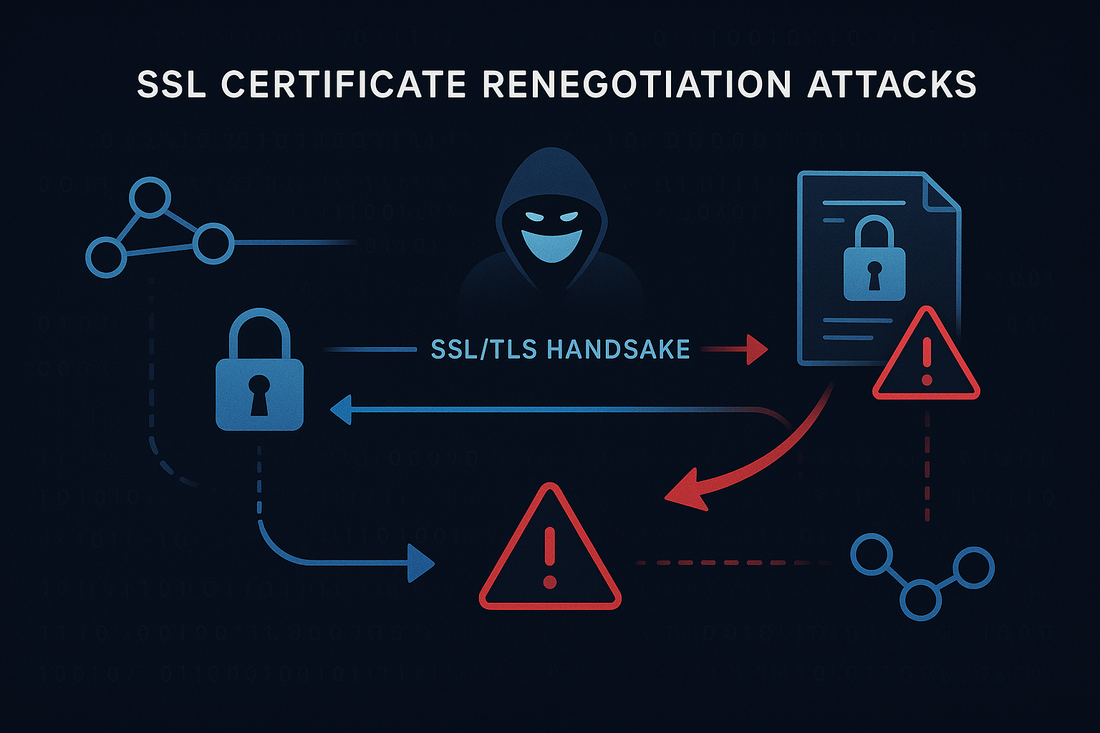
SSL Certificate Renegotiation Attacks
Nicole BrownShare
SSL Certificate renegotiation attacks pose a significant security threat to encrypted communications. As a leading provider of SSL Certificates, Trustico® helps organizations protect against these vulnerabilities through our comprehensive range of Trustico® and Sectigo® SSL Certificate solutions.
Understanding SSL Certificate Renegotiation Attacks
An SSL Certificate renegotiation attack occurs when a malicious actor exploits the SSL Certificate / TLS handshake process to inject malicious data into an encrypted session.
This security vulnerability can allow attackers to hijack authenticated sessions and compromise sensitive data.
Trustico® SSL Certificates implement the latest security protocols and encryption standards to help prevent renegotiation attacks.
Our SSL Certificates use secure renegotiation extensions that validate both the client and server during handshakes.
How SSL Certificate Renegotiation Attacks Work
During a renegotiation attack, the attacker interrupts the initial SSL Certificate / TLS handshake between client and server. They then initiate their own connection to the server while maintaining the original client connection, potentially gaining unauthorized access.
Modern SSL Certificates from Trustico® include built-in protections against these man-in-the-middle attacks. Our SSL Certificates enforce secure renegotiation policies that prevent malicious connection attempts.
Preventing Renegotiation Attacks
Trustico® recommends implementing multiple security measures to protect against SSL Certificate renegotiation vulnerabilities.
Start with a properly configured SSL Certificate from our extensive range of options, including Domain Validated (DV), Organization Validated (OV), and Extended Validation (EV) SSL Certificates.
Both our Trustico® and Sectigo® SSL Certificates feature advanced security capabilities that help prevent renegotiation attacks. These include secure renegotiation indicators, strong cipher suites, and perfect forward secrecy.
Best Practices for SSL Certificate Security
Beyond choosing the right SSL Certificate, organizations should follow security best practices. Trustico® recommends regular security audits, keeping SSL Certificate/TLS configurations up to date, and monitoring for suspicious activity.
Work with Trustico® to implement proper SSL Certificate management processes. This includes maintaining an inventory of SSL Certificates, tracking expiration dates, and planning timely renewals.
Technical Configuration Guidelines
When deploying Trustico® SSL Certificates, ensure your web servers enforce secure renegotiation. Configure systems to use the latest TLS versions and disable older, vulnerable protocols.
Our technical support team can help you properly configure your Trustico® or Sectigo® SSL Certificates. We provide detailed documentation and expert guidance for secure implementation.
Ongoing Protection and Support
Trustico® remains committed to helping organizations maintain strong SSL Certificate security. We continuously monitor emerging threats and update our SSL Certificate offerings to address new vulnerabilities.
Choose Trustico® as your trusted SSL Certificate provider to protect against renegotiation attacks and other security threats, both now and as new attacks surface.
Our commitment and selection of SSL Certificates delivers the validation levels and security features modern organizations need and are constantly adapting to mitigate new attacks as they arise.



